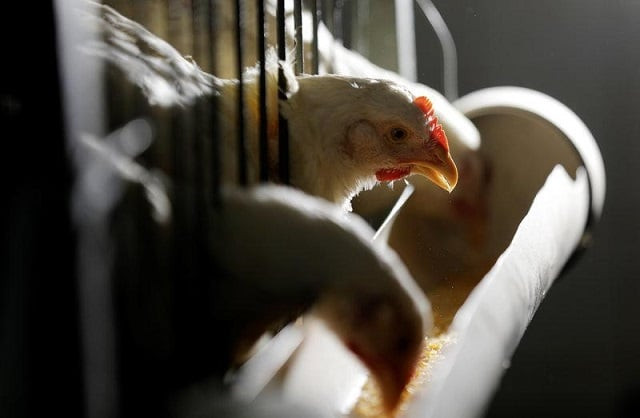Brazil's 'chicken catchers' are victims of forced labour
Brazil is the world's largest exporter of poultry

File Photo: Chickens for sale are seen in cages in a shop in Sao Paulo, Brazil August 18, 2017.
PHOTO: REUTERS
Slave labour in Brazil's poultry sector is 'endemic', said the report by the Washington-based Institute for Agriculture and Trade Policy (IATP) that called for improved working conditions, enforced labour rights and implementation of work contracts. Brazil is the world's largest exporter of poultry
I am heartbroken, angry and confused: Gigi Hadid on Libya slave trade
Under Brazilian law, forced labour is defined as a form of modern-day slavery that includes debt bondage, degrading work conditions and long hours that pose a risk to workers' health or life and violate their dignity. In its poultry industry, teams of about 10 labourers known as chicken catchers collect the birds that are crammed onto large farms, working up to 20 hours and catching more than 50,000 chickens a day, the report said.
The back-breaking work of chicken catching is considered dirty and dangerous, as poultry can peck, claw and defecate as it is trapped. "Workers tasked with catching these chickens and transporting them from farms to slaughterhouses suffer egregious working conditions," said the report by IATP, Berlin-based Heinrich Boll Foundation and Brazilian rights group FASE.
Dozens of companies, including Brazil's JBS SA, a global meatpacking company, signed onto a 2007 National Pact for the Eradication of Slave Labor, part of an effort to rid supply chains of slavery. In response to the report, JBS, the world's biggest meat producer, said the company and its suppliers 'repudiate' any use of slave labour. ".. all contracts signed by JBS have a specific clause that explicitly prohibits practices that may establish the use of labour analogous to slave and child labour," the company said in an emailed statement to the Thomson Reuters Foundation.
Treat trafficking as a health problem to break cycle of abuse, say academics
Brazil's BRF, one of the world's largest poultry exporters, and the labour ministry did not respond for requests for comment. More than 160,000 people are believed to be trapped in modern slavery in Brazil that includes forced labour, according to the Walk Free Foundation, a rights group.
In the past decade, numerous reports by local campaigners have put the spotlight on slave labour in Brazil's meat and cattle industry, revealing a complex web of suppliers across the globe. Many cases involve forced labour on cattle ranches across Brazil's remote and jungle areas. Last year, raids carried out by government labour inspectors identified 885 labourers in slave-like conditions, with more than half found in agriculture and cattle ranching, down from 1,509 in 2014.



















COMMENTS
Comments are moderated and generally will be posted if they are on-topic and not abusive.
For more information, please see our Comments FAQ